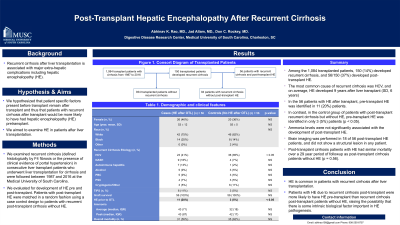Tuesday Poster Session
Category: Liver
P4633 - Post-Transplant Hepatic Encephalopathy After Recurrent Cirrhosis
Tuesday, October 29, 2024
10:30 AM - 4:00 PM ET
Location: Exhibit Hall E

Has Audio
- AR
Abhinav Rao, MD
Trident Medical Center
Charleston, SC
Presenting Author(s)
Abhinav Rao, MD1, Jad Allam, MD2, Don Rockey, MD2
1Trident Medical Center, Charleston, SC; 2Medical University of South Carolina, Charleston, SC
Introduction: Post-transplant recurrent cirrhosis leads to extra-hepatic complications including hepatic encephalopathy (HE). Here, we hypothesized that HE is more likely to develop in patients with recurrent cirrhosis post-transplant in patients who had HE pre-transplant.
Methods: We examined recurrent cirrhosis (defined by histology or the presence of clinical complications) in consecutive liver transplant patients who underwent liver transplantation for cirrhosis and were followed between 1987 and 2016 at the Medical University of South Carolina. We evaluated for development of HE pre and post-transplant. Patients with post-transplant HE were matched in a random fashion using a case control design to patients with recurrent post-transplant cirrhosis without HE.
Results: Among the 1,084 transplanted patients, 150 (14%) developed recurrent cirrhosis, and 56/150 (37%) developed post-transplant HE. The most common cause of recurrent cirrhosis was HCV, and on average, HE developed 9 years after liver transplant (SD, 6 years) (Table). In the 56 patients with HE after transplant, pre-transplant HE was identified in 11 (20%) patients. In contrast, in the control group of patients with post-transplant recurrent cirrhosis but without HE, pre-transplant HE was identified in 3 (5%) patients (p < 0.05). Ammonia levels were not significantly associated with the development of post-transplant HE. Brain imaging was performed in 18 of 56 post-transplant HE patients, and did not show a structural lesion in any patient. Post-transplant cirrhosis patients with HE had similar mortality over a 29 year period of followup as post-transplant cirrhosis patients without HE (p = 0.56).
Discussion: HE is common in patients with recurrent cirrhosis after liver transplantation. Patients with HE due to recurrent cirrhosis post-transplant were more likely to have HE pre-transplant than recurrent cirrhosis post-transplant patients without HE, raising the possibility that there is some intrinsic biological factor important in HE pathogenesis.
Note: The table for this abstract can be viewed in the ePoster Gallery section of the ACG 2024 ePoster Site or in The American Journal of Gastroenterology's abstract supplement issue, both of which will be available starting October 27, 2024.
Disclosures:
Abhinav Rao, MD1, Jad Allam, MD2, Don Rockey, MD2. P4633 - Post-Transplant Hepatic Encephalopathy After Recurrent Cirrhosis, ACG 2024 Annual Scientific Meeting Abstracts. Philadelphia, PA: American College of Gastroenterology.
1Trident Medical Center, Charleston, SC; 2Medical University of South Carolina, Charleston, SC
Introduction: Post-transplant recurrent cirrhosis leads to extra-hepatic complications including hepatic encephalopathy (HE). Here, we hypothesized that HE is more likely to develop in patients with recurrent cirrhosis post-transplant in patients who had HE pre-transplant.
Methods: We examined recurrent cirrhosis (defined by histology or the presence of clinical complications) in consecutive liver transplant patients who underwent liver transplantation for cirrhosis and were followed between 1987 and 2016 at the Medical University of South Carolina. We evaluated for development of HE pre and post-transplant. Patients with post-transplant HE were matched in a random fashion using a case control design to patients with recurrent post-transplant cirrhosis without HE.
Results: Among the 1,084 transplanted patients, 150 (14%) developed recurrent cirrhosis, and 56/150 (37%) developed post-transplant HE. The most common cause of recurrent cirrhosis was HCV, and on average, HE developed 9 years after liver transplant (SD, 6 years) (Table). In the 56 patients with HE after transplant, pre-transplant HE was identified in 11 (20%) patients. In contrast, in the control group of patients with post-transplant recurrent cirrhosis but without HE, pre-transplant HE was identified in 3 (5%) patients (p < 0.05). Ammonia levels were not significantly associated with the development of post-transplant HE. Brain imaging was performed in 18 of 56 post-transplant HE patients, and did not show a structural lesion in any patient. Post-transplant cirrhosis patients with HE had similar mortality over a 29 year period of followup as post-transplant cirrhosis patients without HE (p = 0.56).
Discussion: HE is common in patients with recurrent cirrhosis after liver transplantation. Patients with HE due to recurrent cirrhosis post-transplant were more likely to have HE pre-transplant than recurrent cirrhosis post-transplant patients without HE, raising the possibility that there is some intrinsic biological factor important in HE pathogenesis.
Note: The table for this abstract can be viewed in the ePoster Gallery section of the ACG 2024 ePoster Site or in The American Journal of Gastroenterology's abstract supplement issue, both of which will be available starting October 27, 2024.
Disclosures:
Abhinav Rao indicated no relevant financial relationships.
Jad Allam indicated no relevant financial relationships.
Don Rockey indicated no relevant financial relationships.
Abhinav Rao, MD1, Jad Allam, MD2, Don Rockey, MD2. P4633 - Post-Transplant Hepatic Encephalopathy After Recurrent Cirrhosis, ACG 2024 Annual Scientific Meeting Abstracts. Philadelphia, PA: American College of Gastroenterology.
